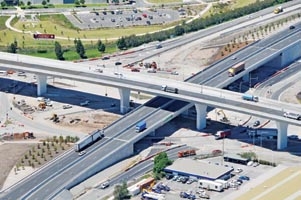Poor investment in infrastructure holding Australia back
 AUSTRALIA’s economic growth is being held back because of major underinvestment in infrastructure, according to research by think-tank the ADC Forum.
AUSTRALIA’s economic growth is being held back because of major underinvestment in infrastructure, according to research by think-tank the ADC Forum.
ADC Forum chair, John Stanley, said the group’s research revealed that since the mid-1980s Australian investment in essential transport infrastructure had fallen behind by more than $250 billion.
Professor Stanley said the failure to make this investment had cost Australia dearly, reducing the national productivity growth rate by between 0.2 and 0.5 percent a year, as estimated by the National Institute of Economic and Industry Research (NIEIR).
It is a theme that has been picked up on by the Federal Government, with Prime Minister Tony Abbott committing to a concentration upon new infrastructure development and insisting his term will become known as ‘the infrastructure government’.
Prof. Stanley said the impacts of inadequate infrastructure investment can be seen in congested public transport services and roads, lagged provision of social infrastructure and services in fast growing outer suburbs, housing supply problems linked to poor accessibility and deteriorating roads in regional and rural areas.
“This is not a blame game,” Prof. Stanley said. “As a nation we have failed in the area of infrastructure over many years. It is important for us to come together to tackle the issue and recapture our lost potential.”
ADC Forum is holding a National Infrastructure and Cities Summit in Sydney on March 13-14. Prof. Stanley said it was designed to bring together key stakeholders to find innovative solutions to the problem of under-investment in infrastructure.
He said the Summit was about finding innovative solutions, building on work which has already been done and examining key issues.
“If infrastructure spending is to be lifted, what should be our top priorities? How should they be determined? Are we getting maximum value from our existing infrastructure base and, if not, what do we need to do to improve performance?” Prof. Stanley asked.
“Our current approach to infrastructure prioritisation in Australia is heavily weighted towards a small number of major projects, particularly big transport projects.
“Is this going to deliver better productivity and liveability outcomes than spreading our focus more widely, across cities and regions and different sectors? Integrated planning of our land use, transport and other infrastructure, with disciplined application of cost benefit analysis, is fundamental to answering these questions.
“Reforming the way we charge for road use is a central part of the solution in the transport sector.”
The Summit will bring together Australian experts, decision makers and leading international experts, including Prof. Robert Cervero from University of California, Berkeley, a world leader in the area of integrated land use and transport planning.
Prof. Khoo Teng Chye, executive director of the Centre for Liveable Cities, Ministry of National Development of Singapore, will also be speaking about how Singapore has dramatically improved its water self-sufficiency.
Federal Ministers and Shadow Ministers will also participate in the Summit.
Eight expert working groups have been preparing for the Summit over several months and Prof. Stanley is confident the event will contribute practical solutions.
“If we are not to slip further behind as a nation, we need fresh and innovative approaches, particularly in the way in which infrastructure is funded,” he said.
“We expect significant game-changing ideas to be presented and the Summit will be a major national forum for essential debate and testing new ideas.”
Prof. Stanley said the ADC Forum was a wholly Australian, non-political, not-for-profit leadership organisation which brings together leaders from business, government, the public sector, academia and the broader community to improve their understanding of key issues affecting Australia.
ends

